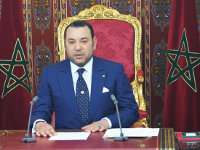Registration
Thank you!
You will receive an email confirming your registration.
IMGXYZ2478IMGZYXSince the mid 1990s, Morocco has presented itself as a model of gradual and genuine democratization in the Middle East and North Africa. However, Moroccan democracy continues to face significant challenges, such as the need to include Islamist groups in the political process and strengthen political parties.
At an event hosted by Carnegie on April 27, Mustapha Khalfi, the director of Moroccan Center for Contemporary Research and Studies and a member of the national council of the Justice and Development Party shares his perspective on the past achievements and future needs of Moroccan democracy. Marina Ottoway moderated.
The Moroccan Model of Democratization
According to Khalfi, the Moroccan model of democratization has been built on the following principles:
- Human Rights: Recognition of past human rights abuses by the government and reconciliation with aggrieved groups.
- Greater Participation: Recognition of Morocco’s cultural diversity and the encouragement of minority participation in the government, notably moderate Islamist and leftist parties.
- Women’s Rights: Greater rights and protections for women.
- Power Shift: Moroccan democracy has been marked by a gradual shift of governmental power away from the king and towards elected officials. In the past, for example, the king could nominate anyone to the post of prime minister. Now, his choice is limited to selecting an individual from the winning political party.
- Ministerial Councils: Ministerial councils with a strong mandate and policy influence are held accountable to elected officials.
Democratic Weaknesses
Participation in the 2007 election was low only 37 percent suggesting that some of the momentum for democratization in Morocco had slowed. Public trust in the electoral process and parliament appeared to be waning. Khalfi argued that this loss of trust was the result of two factors:
- Lack of Improvement: Political parties failed to improve in quality and capability.
- Lack of Implementation: Many of the promised reforms (language, gender, human rights) remained constitutionally unimplemented.
To address these weaknesses, Morocco’s government worked with political parties to strengthen their administrative capacity. There was also an effort among political parties to improve cooperation and dialogue, resulting in the rapprochement of the two strongest political parties, the Socialist Party and the Justice and Development Party (PJD). The new partnership has led to successful efforts to pass legislative reforms, in particular measures designed to improve local governance.
These initiatives contributed to a renewed public trust in the electoral process, and participation in the 2009 elections reached 51 percent, equaling historic highs.
Looking to the Future of Moroccan Democracy
Khalfi suggested that although Moroccan democracy has made great strides in recent decades, further reforms are required, including:
- Constitutionally guarantee democratic reforms and empower the judicial system to enforce legislation.
- Better define the legal line that separates private and public spheres, particularly in regards to the rights of minorities.
- Strengthen the political integration and democratic culture of Islamist parties.
- Legally address the pressures of regionalization, including the Western Sahara territory.
Khalfi noted that although Moroccan democratization has so far been largely top-down, there are increasing signs of grassroots support for democratic reforms.
